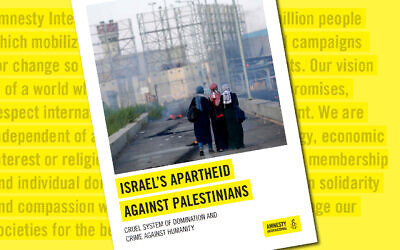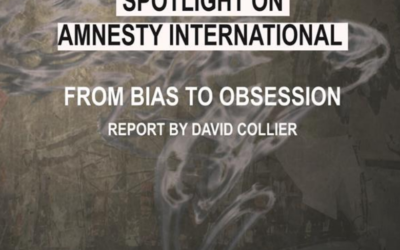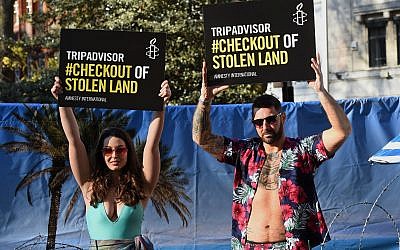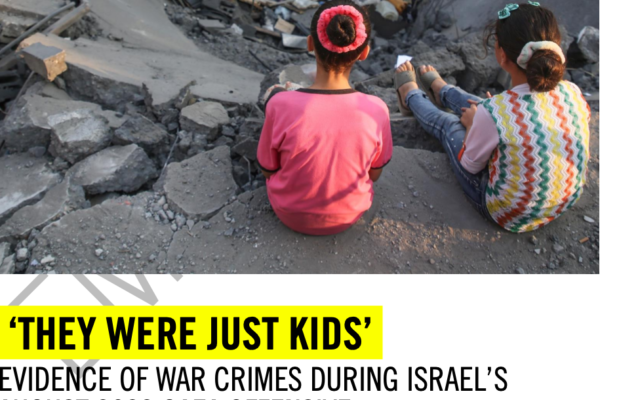New Amnesty report accuses both Israelis and Palestinians of ‘likely war crimes’
Group accuses Israel of killing five children at a cemetery during last year's Gaza offensive - and also says 'misfiring rockets' fired by Palestinian terrorists killed civilians
Lee Harpin is the Jewish News's political editor
A new Amnesty International report has accused both Israeli forces and Palestinian armed groups of committing “likely war crimes” during the most recent offensive in Gaza.
In allegations published on Tuesday, the human rights group urged the International Criminal Court (ICC) to investigate the claims of “unlawful killings” after Israel launched “pre-emptive” military strikes to target Palestinian Islamic Jihad and its armed wing the Al-Quds Brigades.
Amongst the allegations detailed in the 20 page report are claims that an Israeli drone killed five children at a cemetery after the offensive began on August 5th last year.
A Palestinian woman drinking tea at home with her family is also alleged to have come under attack.
But the report also states that the deaths of seven civilians were likely to have been caused by a Palestinian rocket that misfired by militants.
It also states that seven remaining civilian deaths involving Palestinians saw remnants of weapons being “immediately removed.”
While the report attempts to blame both sides for civilian deaths, in a more balanced manner than previous Amnesty reports, it is likely to anger pro-Israel campaigners with its reference to “apartheid” being practised in the Occupied territories.
But the new investigation also outlines detailed claims of misconduct by Palestinian terror groups like Islamic Jihad.
Amnesty concludes in the report that the removal of evidence of attacks in Gaza “matches a pattern identified in past cases where Palestinian rockets have misfired.”
The report adds:”Amnesty believes there is sufficient evidence to indicate the attack on Jabalia refugee camp was the result of a misfiring rocket launched by Palestinian armed groups, apparently targeted towards Israeli territory.
“Researchers identified several commonalities between the attack in Jabalia and previous strikes attributed to Palestinian armed groups. For example, weapons remnants had been removed – this is notable because the Palestinian authorities and armed groups in Gaza generally preserve and display remnants of Israeli weapons and munitions.
“Locals interviewed by Amnesty said they had neither seen nor heard an Israeli warplane or drone before the strike.
“Other residents, who requested anonymity, said they believed a ‘local rocket; was responsible for the attack.
“Two minutes before the strike, the Al-Quds Brigades began sharing on social media a live video of what it described as a volley of rockets being fired towards Israel.
“Like other cases in which similar Palestinian rockets allegedly caused civilian deaths and injuries, the attack on Jabalia camp should be investigated as a possible war crime.”
The report adds that since 2008, Palestinian armed groups have fired thousands of indiscriminate rockets towards Israeli towns and cities – in violation of international law – killing dozens of Israeli civilians.
The unguided rockets used by Palestinian armed groups in Gaza, including the Al-Quds Brigades, are “inherently inaccurate”, state Amnesty.
They add:”Their use in civilian areas violates international humanitarian law and may amount to a war crime. ”

Fighting had erupted on August 5 between Israel and Palestinian militants over claims they were planning terrorist attacks inside the Jewish state.
The conflict lasted for three days, with Islamic Jihad firing at least 1,000 rockets into southern Israel.
During the clashes Israel Defence Forces (IDF) managed to kill two senior Islamic Jihad commanders, on top of arresting another, Bassam al-Saadi, in the occupied West Bank city of Jenin.
Sixty people in Israel suffered minor injuries, but the majority of Islamic Jihad’s projectiles were intercepted by the Iron Dome missile defence system.
In total, 49 Palestinians were killed and at least 360 Palestinians were injured, including 151 children, according to the United Nations.
Amnesty International concluded, based on its research, that 31 civilians were among those killed.
Its assessment is that 33 Palestinians, including 17 civilians, were killed by Israeli forces.
Of the remaining 16 Palestinians who were killed, Amnesty International concluded that 14 were civilians.
Using photographs of weapons fragments, satellite imagery analysis and testimony from dozens of interviews, the report – ‘They were just kids’: Evidence of war crimes during Israel’s August 2022 Gaza offensive – attempts to reconstruct the circumstances around three specific attacks during the offensive.
Two were carried out by Israeli forces and one by a Palestinian armed group.
Amnesty said the two Israeli attacks Amnesty examined in detail killed six Palestinian civilians.
They claim:”Throughout the offensive the Israeli authorities boasted about the precision of their operation, yet Amnesty found that victims of these ‘precise’ attacks included a four-year-old boy, a teenager visiting his mother’s grave, and a 22-year-old student at home with her family.”

The rights group said they interviewed 42 people, including survivors of the attacks, relatives of those killed or wounded, eyewitnesses and medics.
Since 2012 Amnesty say the Israeli authorities have denied their staff access to the Gaza Strip.
For their latest report Amnesty say they worked with a fieldworker who visited 17 attack sites and collected evidence such as photographs of weapons remnants.
Amnesty insist their weapons expert and Evidence Lab analysed this material, as well as satellite imagery and other open-source data relating to the attacks.
They say they wrote to the Israeli authorities and to Palestinian Islamic Jihad on 30 September, providing a summary of its key findings and requesting comment. It had not received a response from either at the time of publication.
Agnès Callamard, Amnesty International’s Secretary General, said: “Israel’s latest offensive on Gaza lasted only three days, but that was ample time to unleash fresh trauma and destruction on the besieged population.
“The three deadly attacks we examined must be investigated as war crimes – all victims of unlawful attacks and their families deserve justice and reparations.
“As well as investigating war crimes committed in Gaza, the ICC should consider the crime against humanity of apartheid within its current investigation in the Occupied Palestinian Territories.”
Duniana al-Amour, a 22-year-old fine arts student who lived with her family in a village near Khan Younis in the southern Gaza Strip, was killed in what Amnesty believes was the first Israeli attack of the weekend.
Amnesty concludes that Israeli forces appear to have deliberately targeted the al-Amour house and found no evidence that any members of the family could reasonably be believed to be involved in armed combat.
The Israeli military have not commented on the shelling of the al-Amour home and have given no indication they plan to investigate the killing of Duniana al-Amour.
Another attack took place at the Al-Falluja cemetery in Jabalia in the northern Gaza Strip.
The attack killed five children: Nadhmi Abu Karsh, aged 15, and cousins Jamil Najmiddine Nejem, four, Jamil Ihab Nejem, 14, Hamed Haidar Nejem, 16, and Muhammad Salah Nejem, 16. Amir Abu al-Mi’za, eight, was seriously injured and has shrapnel stuck near his spinal cord.
The children all lived in the severely-overcrowded Jabalia refugee camp.
The Israeli military blamed Palestinian Islamic Jihad for the attack. But on 16 August, unnamed sources from the military told Haaretz newspaper that a preliminary investigation had found that neither Palestinian Islamic Jihad nor the Al-Quds Brigades were firing rockets at the time of the attack. Israeli forces, however, had reportedly been attacking “targets” near the area.
Since the article the Israeli army has neither confirmed nor denied these reports.
Meanwhile on 6 August, a projectile struck a road in Jabalia refugee camp, killing seven Palestinian civilians: Momen al-Neirab, aged six, his brother Ahmad al-Neirab, 12, Hazem Salem, eight, Ahmad Farram, 16, Khalil Abu Hamada, 18, Muhammad Zaqqout, 19, and 50-year-old Nafeth al-Khatib.
Amnesty said it believes there is sufficient evidence to indicate the attack on Jabalia refugee camp was the result of a misfiring rocket launched by Palestinian armed groups, apparently targeted towards Israeli territory.
Researchers identified several commonalities between the attack in Jabalia and previous strikes attributed to Palestinian armed groups.

Amnesty said it has written to Gaza’s Prosecutor General raising concerns about the removal of weapons remnants from attack sites.
It says it also requested information about any investigations into the attack on Jabalia camp and into the four attacks where it could not establish responsibility for civilian deaths.
In response, the Prosecutor General said the Gaza authorities were investigating all cases of violations that occurred during the conflict, but did not mention the Jabalia attack specifically and provided no information about the investigation’s progress.
“To establish responsibility for the civilian deaths and injuries in the Jabalia attack the Palestinian authorities must cooperate with independent investigators, including those from the International Criminal Cour,” said Amnesty. “Eyewitnesses and survivors of the attack must be allowed to speak out without fear of reprisals. ”

Thank you for helping to make Jewish News the leading source of news and opinion for the UK Jewish community. Today we're asking for your invaluable help to continue putting our community first in everything we do.
For as little as £5 a month you can help sustain the vital work we do in celebrating and standing up for Jewish life in Britain.
Jewish News holds our community together and keeps us connected. Like a synagogue, it’s where people turn to feel part of something bigger. It also proudly shows the rest of Britain the vibrancy and rich culture of modern Jewish life.
You can make a quick and easy one-off or monthly contribution of £5, £10, £20 or any other sum you’re comfortable with.
100% of your donation will help us continue celebrating our community, in all its dynamic diversity...
Engaging
Being a community platform means so much more than producing a newspaper and website. One of our proudest roles is media partnering with our invaluable charities to amplify the outstanding work they do to help us all.
Celebrating
There’s no shortage of oys in the world but Jewish News takes every opportunity to celebrate the joys too, through projects like Night of Heroes, 40 Under 40 and other compelling countdowns that make the community kvell with pride.
Pioneering
In the first collaboration between media outlets from different faiths, Jewish News worked with British Muslim TV and Church Times to produce a list of young activists leading the way on interfaith understanding.
Campaigning
Royal Mail issued a stamp honouring Holocaust hero Sir Nicholas Winton after a Jewish News campaign attracted more than 100,000 backers. Jewish Newsalso produces special editions of the paper highlighting pressing issues including mental health and Holocaust remembrance.
Easy access
In an age when news is readily accessible, Jewish News provides high-quality content free online and offline, removing any financial barriers to connecting people.
Voice of our community to wider society
The Jewish News team regularly appears on TV, radio and on the pages of the national press to comment on stories about the Jewish community. Easy access to the paper on the streets of London also means Jewish News provides an invaluable window into the community for the country at large.
We hope you agree all this is worth preserving.






















